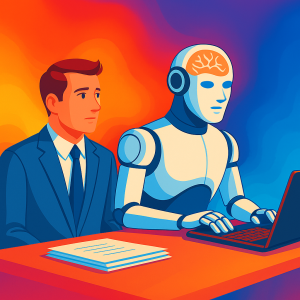 Let’s get something straight: AI is not some futuristic idea. It’s already embedded in how businesses function, how customers behave, and how competitors move.
Let’s get something straight: AI is not some futuristic idea. It’s already embedded in how businesses function, how customers behave, and how competitors move.
If you’re in a fast-moving industry, waiting another year to develop a strategy means you’re not waiting, you’re falling behind. Here are the industries where AI disruption is no longer theoretical. It’s reality.
- Information Technology (IT Services)
AI is rewriting how IT firms deliver support, security, and optimization.
- Predictive maintenance
- Automated helpdesk/chatbots
- AI-powered ticket routing and SLA adherence
- Enhanced vulnerability scanning
Implication: Mid-sized IT companies that don’t integrate AI tools into their delivery are becoming obsolete to enterprise clients. The expectation has shifted.
- ERP Software & Implementation
Enterprise Resource Planning platforms are moving toward self-configuring modules powered by machine learning.
- Intelligent forecasting
- Automated data entry
- Real-time KPI dashboards
- AI-driven inventory and supply chain planning
Implication: ERP vendors and consultants that aren’t adapting to AI-powered platforms are losing bids. Many RFPs now explicitly request AI features.
- Cybersecurity
In a world where threats evolve by the second, AI isn’t optional—it’s essential.
- Threat detection via anomaly scanning
- Behavior-based intrusion prediction
- AI incident triage and prioritization
- Auto-remediation tools
Implication: Cybersecurity firms that still rely on traditional manual processes are now viewed as riskier by clients.
- MarTech & AdTech
Marketing and ad platforms are racing toward full automation:
- AI-generated campaigns
- Predictive performance modeling
- Autonomous bidding in Google Ads & Meta
- Customer journey orchestration
Implication: Agencies and tech firms in the marketing stack must learn to ride the wave or risk irrelevance.
- Professional Services
Even industries like legal, accounting, and consulting are under the microscope:
- Contract analysis tools
- AI-assisted bookkeeping
- Virtual consultants
- Document summarization and legal brief generation
Implication: Firms that adopt AI tools enhance speed, accuracy, and profitability—giving them a major edge.
So… What Should You Do About It?
- Audit Your Infrastructure: Where are manual processes slowing you down? Where could AI speed you up?
- Look at Tech That is All in One: Going with the add-ons your ERP provider offers may not be the way. Tools like HubSpot that address marketing, sales and service give organizations powerful capabilities and alignment across these teams that merits using it even with the existence of a secondary system for ERP.
- Modernize Your Website and CRM: AI-integrated platforms need modern front-end systems. If your site is outdated or your CRM underused, that’s your first bottleneck.
- Start Small But Start Now: Test AI in one department (sales, service, or ops). Measure performance. Expand quickly.
- Consider AI in Your Marketing: If you are not producing content with the intention of it being produced in an AI answer, start!
- Partner with Experts: Trying to DIY your AI roadmap could waste months. Work with partners who’ve already implemented it across industries.
Another Year is Not an Option
2026 isn’t when the shift begins. The fact that we see business owners of mid-sized organizations with no digital strategy and not concerned about it, like “we can get to it next year” is incredible. In 2026 the winners and losers will already be visible. Optimization is not something that builds over night. If you’re in any of the industries above, the time to act is now.
Let Pulsion help you build an AI-ready digital marketing and strategy that will have you more then prepared. Visit www.gopulsion.io to learn more.